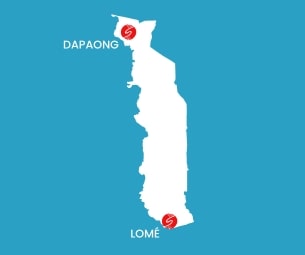Context
In Togo’s Savanes region, the areas receiving displaced people and refugees are mostly fragile rural areas, where people who are often already vulnerable also have to struggle to adapt to the consequences of climate change.
Food insecurity has worsened in recent years, with part of the population in phase 3 and 4 of the integrated food classification framework, and malnutrition levels higher than the country’s average. Despite the efforts of government departments, health services and water, sanitation and hygiene infrastructure are inadequate and struggling to meet the needs of the population.
In this unstable context, women, girls, marginalised people and people with disabilities face new difficulties and are all the more vulnerable.
- 7.86 million inhabitants
- 166th out of 189 countries on the Human Development Index
Our action

-
Mission
opened in 2023 -
Team
4 international staff
- Budget 750,000 euros
SOLIDARITÉS INTERNATIONAL carried out an exploratory mission in March 2023 in northern Togo, in the Savanes region. Together with its local partners, the team was able to assess the needs of the affected populations in order to provide a response, in coordination with national programmes.
Working with local stakeholders, SOLIDARITÉS INTERNATIONAL has developed a multi-sectoral strategy to help reduce the impact of the conflict in the Sahel on vulnerable populations:
- Support for displaced people and host communities: Distribution of multi-sector kits (food and NFIs) for new arrivals, distribution of essential items, referral of cases of protection and malnutrition,
- Strengthening infrastructure providing access to drinking water and sanitation (construction and rehabilitation)
- Actions to strengthen the resilience of local populations
Financial partners: French crisis and support centre
Operational partners: OREPSA, ANPC, local authorities in intervention zones (prefectures and town halls, etc.)
Our impact

Water, sanitation and hygien
- Rehabilitation of 14 boreholes equipped with human-powered pumps
- Setting up water point management committees
- The construction of latrines in 6 community facilities (health centres, transit centres and temporary shelters)
- Organising hygiene promotion sessions

Identifying needs
- Interviews with displaced persons and hosts in order to identify cases of protection and/or malnutrition and refer them to the appropriate structures.

Kits distribution
- Distribution of 2,500 kits designed to cover the immediate EHA, food and basic shelter needs of a family of 6, displaced, refugees or vulnerable guests.
Should you have any questions, please contact Xavier Lauth

Vacancies
At head office
Worldwide
Internships
